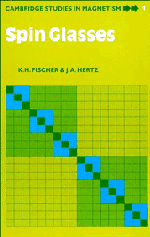Book contents
- Frontmatter
- Contents
- Preface
- 1 Introduction
- 2 Models, order parameters, and systems
- 3 Mean field theory I: Ising model, equilibrium theory
- 4 Introduction to dynamics
- 5 Mean field theory II: Ising dynamics
- 6 Mean field theory III: vector spins
- 7 Short-range interactions: low-temperature properties
- 8 Beyond mean field theory
- 9 Dynamics on many time scales
- 10 Specific heat, sound propagation, and transport properties
- 11 Competition between spin glass and ferromagnetic or antiferromagnetic order
- 12 One-dimensional models
- 13 Random field and random anisotropy
- 14 The physics of complexity
- 15 A short history of spin glasses
- References
- Index
7 - Short-range interactions: low-temperature properties
Published online by Cambridge University Press: 01 June 2011
- Frontmatter
- Contents
- Preface
- 1 Introduction
- 2 Models, order parameters, and systems
- 3 Mean field theory I: Ising model, equilibrium theory
- 4 Introduction to dynamics
- 5 Mean field theory II: Ising dynamics
- 6 Mean field theory III: vector spins
- 7 Short-range interactions: low-temperature properties
- 8 Beyond mean field theory
- 9 Dynamics on many time scales
- 10 Specific heat, sound propagation, and transport properties
- 11 Competition between spin glass and ferromagnetic or antiferromagnetic order
- 12 One-dimensional models
- 13 Random field and random anisotropy
- 14 The physics of complexity
- 15 A short history of spin glasses
- References
- Index
Summary
The mean field theory discussed in the preceding chapters revealed a surprisingly rich structure and in particular a very complex ordered phase with many ‘pure’ states. However, we know from periodic systems that the mean field theory does not always give the right answer. In this and the next two chapters, we will discuss alternative approaches to the study of spin glasses with short-range interactions. The most important one will be the renormalization group which led to a deep understanding of phase transitions (and in particular critical behaviour) of nonrandom systems and which has also turned out to be extremely useful for the study of spin glasses. Together with Monte Carlo simulations and experimental data, this will give us a fairly complete picture, at least of static spin glass properties below Tf. Critical behaviour near Tf and scaling arguments for T < Tf have also been considered for the spin glass dynamics but here the situation seems to be less clear. Depending on the system, the remanent magnetization decays with quite different decay laws (see Chapter 1), which indicates that not all dynamic processes are universal. However, all spin glasses have a huge range of characteristic relaxation times, ranging from 10−13s (the Korringa relaxation in a metallic spin glass) to 10−6 – 10−8s. This long-time limit is not inherent to the system but is simply determined by the patience of an experimentalist (or the average time of a student's thesis).
- Type
- Chapter
- Information
- Spin Glasses , pp. 193 - 218Publisher: Cambridge University PressPrint publication year: 1991



